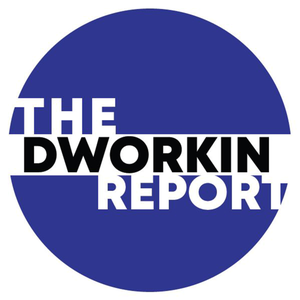
The Dworkin Report
Dworkin Report
The Dworkin Report is one of the most listened to independent podcasts in the world. New releases are ranked top 200 in news & politics on iTunes in 30+ countries. The podcast has listeners in almost every country in the world. Some of Scott’s guests have included Speaker Nancy Pelosi, Alyssa Milano, Alec Baldwin, Bill Browder, Rob Reiner, Rep. Steve Cohen, Mary L. Trump, Bandy X. Lee, Cheri Jacobus, Lilly Ledbetter, Judd Legum, Tom Arnold, Rep. Gwen Moore, Rosie O’Donnell, David Priess, Michael Rapaport, and Malcolm Nance. The podcast covers news, politics, books, culture, and more. Support this podcast: https://anchor.fm/dworkinreport/support
- 16 minutes 19 secondsAuthor reveals how GOP became toxic, from the rise of Gingrich to Trump
Princeton political history Professor and CNN Commentator Julian Zelizer returns to the Dworkin Report to discuss his book, Burning Down the House: Newt Gingrich, the Fall of a Speaker, and the Rise of the New Republican Party.
Professor Zelizer tells us how Newt Gingrich’s rise to power in the Republican party was the turning point that led to the birth of the Tea Party movement, the catastrophic Presidency of Donald Trump, and the modern toxic GOP.
Zelizer gave us a breakdown of how it all ended for Newt Gingrich and what it can teach us about modern Republicans as we head into the 2022 midterms.
“If you go back to the eighties, the Reagan years, and you look at Gingrich and what he was doing on Capitol Hill, you see this new style of partisanship, from vicious takedowns of opponents to the use of any kind of toxic language that one wants to the constant prioritization of partisanship over governing,” says the Princeton professor. “This is now deeply embedded in the DNA of the GOP. And you need to understand that to make sense of why [Trump’s] support among Republicans remains pretty strong.”
We also discuss Newt’s “Contract with America,” which never materialized into actually passed laws but helped Republicans in the 1994 elections.
“It was a gimmick. A series of promises that focused on an eclectic mix of anti-politics, conservative law and order, and fiscal conservative promises,” says Zelizer. “And then it became a problem because after Republicans do take over, they’re unable to pass almost any of it. So it becomes just a reminder of what they didn’t do.”
Recently, Gingrich helped GOP House minority leader Kevin McCarthy construct a similar plan that CNN called “going small.”
This interview explores how Newt Gingrich’s GOP, over the course of a decade, rid the party of the inconvenient ideas that governance matters and that politicians have a responsibility to make sure our institutions work. Through political theater and criminalizing Democrats, Gingrich showed modern Republicans how to weaponize governance and partisan attacks. In many ways, it was the Georgia Republican’s hypocritical actions that laid the pathway for Donald Trump to take over the Republican party today.
Julian E. Zelizer is a Professor of History and Public Affairs at Princeton University. Zelizer, a CNN Political Analyst and NPR contributor, is the author and editor of 24 books on U.S. political history. You can follow him on Twitter @JulianZelizer.
This post uses affiliate links.
27 October 2022, 2:07 am - 21 minutes 51 secondsFmr. Melania advisor reveals the Trump family profited off of 2017 Inaugural CommitteeScott interviews Stephanie Winston Wolkoff, who served as executive producer and adviser to the Inaugural Committee for Donald Trump, as well as an advisor to Melania Trump in this first part of a multi-part interview. Winston Wolkoff authored the revelatory NY Times #1 best-selling book: Melania and Me, an intimate look at her now broken relationship with the former first lady and President Trump. Before her work with the Trump inaugural and former first lady, Stephanie enjoyed a successful three-decade career in the fashion entertainment industry where she worked as a Public Relations Manager and an Event Fashion Director for Vogue Magazine, the place where she first formed a relationship in 2003 with Donald’s then-girlfriend, Melania. Stephanie would go on to attend the Trumps’ wedding and baby shower, and lunched with Melania frequently, then considering the two to be dear friends. After Vogue, Winston Wolkoff went on to produce some of the most significant events in the world, like Fashion’s Night Out and the Style Awards. She also served as the founding fashion director for the Lincoln Center and much more. In our interview, Stephanie explains that Melania and later Ivanka Trump asked her to join the 2017 inaugural committee. She tells us, “I was so honored to be asked. Having produced all the events that I’ve done and being a part of history - I felt an obligation. How could I say no to produce in the presidential inauguration?” Winston Wolkoff gives our listeners an in-depth look at the inaugural committee as a chaotic array of vendors and ever-expanding budgets marching in different directions. She attempted to raise concerns about questionable spending and preparations back in 2017 but was consistently silenced by her peers. “The Met Gala was a piece of cake compared to planning the presidential inauguration,” Stephanie went on to tell us, “It [the inaugural] was like a circus, and I didn’t realize that I was going to be the woman blown out of the cannon!” It has been widely reported that Stephanie’s firm was paid over $26m by the committee, with $25m of that amount being used for inaugural productions. But surprisingly, Stephanie cannot confirm that any of the $1.6 million budgeted to her firm for running the inaugural was actually sent to her personally. “Where did that $1.6m go?” asked Scott. Stephanie revealed that many third-party vendors were actually being double-paid, outlining how the inaugural committee regularly approved frivolous expenses - like $50,000 LED screens - for the one-time event. “That’s where… ‘red sirens’ kept going off,” Winston Wolkoff explained. “Instinctively, I know that when something doesn’t seem right, you just express it to the people that are in charge. And so I did openly, constantly.” She also confirms, as she did to the US Attorney General’s office, that the Trump family and the family business profited from the inaugural committee. “There’s no doubt about that, Stephanie said. “The receipts are there.” This post contains affiliate links.20 October 2022, 9:00 am
- 18 minutes 30 secondsTop Georgia journalist warns about Herschel Walker's political assets
Award-winning journalist and author Greg Bluestein of the Atlanta Journal-Constitution joined our show to talk about what lessons can be learned from the 2020 special elections in Georgia and shared wisdom about Herschel Walker's campaign.
We discussed his excellent book, Flipped: How Georgia Turned Purple and Broke the Monopoly on Republican Power. Greg takes readers through the run-up to the Special Election and gives a detailed look at how both parties successfully worked to play to their bases. He said the elections which flipped control of Congress to Democrats and how that can be used as a roadmap for another Warnock victory in the midterms.
We also talked about the circumstances and political environment that shaped those special elections, and Bluestein provided us with valuable insight into new voting laws that make it harder to vote in Georgia and what all of this may mean for the upcoming election.
Greg also warned our audience not to take Herschel Walker for granted.
“He makes a lot of blunders, a lot of gaffes, a lot of strange and bizarre compounding statements. And so in a head-to-head match-up with Walker, Democrats are pretty optimistic. Then again, you can't underestimate Herschel Walker's name recognition or the fact that Georgians like me grew up hearing stories of his legendary athletic feats. His name recognition is almost universally known in Georgia, and that counts for a lot.”
In this interview, we discussed Greg’s path to journalism, his love for Atlanta baseball, and how he thinks the 2022 midterms will play out in Georgia.
Greg Bluestein is an American journalist, author, and TV analyst who covers Georgia politics for The Atlanta Journal-Constitution. He has also written about former President Jimmy Carter and covered regional and national news as an Atlanta-based journalist for The Associated Press. He contributes to the Political Insider blog, is an MSNBC and NBC News contributor, and is a host of the Politically Georgia podcast. You can follow him on Twitter @bluestein.
This post uses affiliate links.
18 October 2022, 9:00 am - 22 minutes 49 secondsInside Trump's willful dereliction of duty on Jan. 6th with Philip Rucker
Scott interviews Philip Rucker, co-author of the New York Times bestselling book "I Alone Can Fix It: Donald Trump’s Catastrophic Final Year” with his Washington Post colleague, Carol Leonnig. Their book opens at the very beginning of 2020 when the COVID pandemic arrives, carries through the January 6, 2021 insurrection, and ends with Joe Biden's inauguration 14 days later.
The book includes material from 140 sources, including cabinet members, senior administration officials, advisors, and a bizarre interview with Trump himself. I Alone Can Fix It gives readers a thorough behind-the-scenes look at Trump's handling of the final year of his presidency.
Philip talks to Scott about Trump’s reaction to January 6th and how Mike Pence fulfilled the President’s duties that day.
Rucker set out to learn specifics about cabinet meetings with Trump. What was everybody saying around the table specifically? What were people writing in their diaries? What were people remembering?
In this interview, Scott discusses the highlights of some of Rucker’s work and asks probing questions about the reception of this crucial information to voters.
“Vice President Pence was on the phone with the Pentagon to make sure the National Guard were on the way and to make sure troops were coming to the Capitol to help secure it and to assist the Capitol Police, who were obviously seized and beleaguered,” the Pulitzer Prize-winning journalist explained. “Pence was the one who fulfilled those presidential duties that day, in large part because Trump was AWOL. He was too busy watching the television.”
“He was fixated on November 3rd and making sure that he would be popular. And so at every turn during the coronavirus response.” Rucker told Scott about the one guiding principle for the former POTUS throughout the pandemic. “Trump was making decisions based on politics, not based on science or how to save lives, or how to level with the American people, but based on how to help himself politically. And that's not our opinion. That's the judgment of the people who worked with Trump in leading the response.”
Philip Rucker is the senior Washington correspondent at The Washington Post and led its coverage of President Trump and his administration as White House Bureau chief. He and a team of Post reporters won the Pulitzer Prize and George Polk Award for their reporting on Russia’s interference in the 2016 presidential election.
Rucker joined the Post in 2005 and previously has covered Congress, the Obama White House, and the 2012 and 2016 presidential campaigns. He is an on-air political analyst for NBC News and MSNBC and graduated from Yale University with a degree in history.
This interview was originally recorded in July 2021. This post uses affiliate links.
13 October 2022, 9:00 am - 25 minutes 15 secondsMichael Cohen can’t hide his disgust at new Manhattan DA’s failure to prosecute Trump
Scott interviews former Trump fixer Michael Cohen, who knows Trump's playbook better than anybody, and tells us if he believes Donald Trump will ever be convicted for any of his crimes after the Manhattan DA dropped the ball and what approach he thinks law enforcement would have to take to get it done.
Michael's New York Times bestselling book is Disloyal: A Memoir: The True Story of the Former Personal Attorney to President Donald J. Trump.
But Cohen couldn't hide the frustration at Manhattan's newly elected District Attorney for ditching a multi-year investigation he cooperated with starting from when he was serving time for carrying out Trump's illegal orders.
As the former personal attorney for Donald Trump from 2006-2018, Cohen was also a vice-president of the Trump Organization.
Since then, Michael has come clean about his crimes committed at the behest of Donald Trump, served his time in prison, and has been one of the most prominent and poignant critics of his former boss, whom he emphatically compares to mob boss Al Capone.
"They couldn't get him on racketeering or any of the other crimes," said Cohen, "Instead, what did they do? They got him on tax evasion."
"And the point was, the American people don't give a shit what the charge against you is," says the first prominent person inside of Trump's circle to warn that he wouldn't relinquish the presidency without violence.
In the second part of this interview series, Michael Cohen once again provides valuable insights to our listeners on how he thinks the disgraced ex-president can finally be brought to justice. And he predicts it won't be the January 6th insurrection that does Trump in.
It's one of the reasons his frustration with the Manhattan DA boiled after his abrupt decision to abandon the yearslong case while New York Attorney General Letitia James methodically carried on investigating the Trump Organization.
Michael Cohen lives in New York City with his wife and two children. He currently runs one of the top 50 political podcasts in the country, Mea Culpa, with new episodes released every Monday and Friday at midnight eastern.
RELATED CONTENT: Lev Parnas just explained how Rudy Giuliani acquired Russian disinformation for Trump
This post contains Amazon affiliate links.
19 July 2022, 12:19 pm - 24 minutes 29 secondsMichael Cohen just explained how Trump set up a GOP Congressman seeking a pardonScott interviews friend and former political opponent, Michael Cohen in part one of this two-part interview. He provided key insight into the unsavory way that the disgraced ex-president handled one of his key House Republican allies at the end of his term, soon after inciting an insurrection against the United State Capitol. As the former personal attorney for Donald Trump from 2006-2018, Cohen was also a vice-president of the Trump Organization and was often described as Trump's "fixer." Cohen was sentenced to three years in federal prison in 2019 for campaign finance violations he committed at the direction of Trump, and for lying to a Senate committee about efforts to build a Trump Tower in Moscow. Since then, Michael has been at the forefront of the opposition to everything about his former boss, whom he repeatedly emphasizes is a “mob boss.” He also wrote a memoir about his experiences entitled, Disloyal: A Memoir: The True Story of the Former Personal Attorney to President Donald J. Trump which calls the ex-New York real estate developer "a cheat, a mobster, a liar, a fraud, a bully, a racist, a predator, a con man.” His proximity to Trump for over a decade gives our listeners a unique first-person perspective on how awful the former guy really was via Michael Cohen. In this interview, Michael leverages his deep understanding and personal experiences to make predictions about the ongoing Jan 6 committee hearings. “This is not going to be the nail in Donald Trump’s coffin,” he said about the Cassidy Hutchinson testimony. “Why? Because every single thing that she said is hearsay. It's not gonna be the nail in the coffin for Donald. But I will tell you what it is: it's the nail in the coffin for all of these people who are tangentially related that made up his inner circle.” Michael Cohen lives in New York City with his wife and two children. He currently runs one of the top 50 political podcasts in the country, Mea Culpa, with new episodes released every Monday and Friday at midnight eastern. This post uses Amazon affiliate links.15 July 2022, 1:12 am
- 17 minutes 1 secondLev Parnas just revealed how Ron DeSantis got Trump's endorsement and the Florida governorship
Scott and Grant interview Lev Parnas, who became well-known for his leading role in the former President’s efforts to pressure Ukraine to launch an investigation into political rival Joe Biden which led to the first of two impeachments against the disgraced former Commander-in-Chief. This is part two of a two-part interview with Parnas recorded on August 5th, 2021.
In this episode, Parnas tells the story of how he went from being apolitical to running in Trump’s inner circle.
He also explains how he came to know Ron DeSantis and reveals for the first time ever that he was the matchmaker between DeSantis and former President Trump. Ultimately, Parnas’ efforts led to an endorsement that flipped the Florida Governor’s Republican primary race in DeSantis’ favor.
1 February 2022, 5:04 pm - 25 minutes 12 secondsAuthor reveals how Peter Thiel helped Trump cut a deal with Facebook to evade fact checking
Scott talks with author and journalist Max Chafkin, who is a features editor and a tech reporter at Bloomberg Businessweek. Max is the author of "The Contrarian: Peter Thiel and Silicon Valley’s Pursuit of Power," a biography about the enigmatic, controversial, and hugely influential power broker Peter Thiel who sits at the dynamic intersection of tech business and politics. Thiel is the co-founder of PayPal, who became a major influence in Facebook as an early investor and the founder of Palantir, a mass surveillance company with extensive government contracts.
As Max explains, Thiel went from being one of the most influential people in the tech industry to becoming an early supporter of Donald Trump and a key player in the rise of the alt-right movement in America.
Because Thiel was a significant contributor to the former President, many questioned the timing of the scores of government and military contracts that Palantir won soon after Trump was elected.
Chafkin explains how Peter Thiel was a central influence on Donald Trump’s grip on power. This was demonstrated when Thiel, a government contractor, made a political visit to Jared Kushner to build bridges between Facebook and the White House at a key moment before last year’s election. The outcome of the meeting was that Mark Zuckerberg agreed to allow Trump’s disinformation to stay on the ubiquitous social platform.
This post uses paid affiliate links.
26 January 2022, 3:46 am - 28 minutes 36 secondsLev Parnas just explained how Rudy Giuliani acquired Russian disinformation for Trump
Scott and Grant interview Lev Parnas, a former political associate of President Trump and a close confidant to his lawyer Rudy Giuliani. This is the first part of a special two-part interview with Lev Parnas, who revealed some stunning, never before known facts to us and our listeners exclusively.
In this first installment, Parnas details precisely who linked the former President’s lawyer Rudy Giuliani directly to a group of Russian agents in Ukraine, who in turn ultimately got sanctioned by the U.S. Treasury Department for interfering in the 2020 election.
And he leveled a serious allegation about former Vice President Mike Pence’s involvement in the Ukrainian quid pro quo that led to Trump’s impeachment. What surprised me is that Parnas says the Trump administration pulled off a dirty deal with the former president of Ukraine and got away with it. As Russia threatens an invasion of the independent nation of Ukraine, this is a major insight for the way Putin took advantage of Trump’s time in the Oval Office.
Lev Parnas is an American citizen, born in Ukraine and raised mostly in Brooklyn, New York who started selling real estate in the 1980s with Fred Trump, and as he explains in this podcast, that backstory and some political donations proved to be his springboard into the former president’s inner circle. But what Lev Parnas is most famous for is his refusal to keep quiet when Trump’s failed international extortion scheme to squeeze political benefits from the president of Ukraine became public.
Perhaps nobody would’ve learned the scope of the official misconduct emanating from the White House in 2019 had it not been for Parnas’ brave truth-telling, despite an outstanding federal indictment that went to trial after we recorded this podcast last summer. A Manhattan jury found him guilty on all 5 counts 11 weeks after this interview, but he plans to appeal the verdict. But anyone who has followed Lev Parnas’ story knows that he has always spoken truthfully in public about his political relationships, and often, he has shown the receipts.
Interview recorded in August 2021.
19 January 2022, 2:29 am - 27 minutes 56 secondsReporter reveals Facebook paid Eastern European troll farms and the sinister secrets behind its algorithm
Scott speaks with Karen Hao the senior Artificial Intelligence editor for MIT Technology Review whose groundbreaking work looking into Facebook just got validated in a massive way this week by whistleblower Francis Haugen's testimony to the U.S. Senate. Hao holds a mechanical engineering degree from MIT, which she took to outlets like Mother Jones and Quartz where she honed her craft as a data journalist before earning her current senior role and recently becoming a Knight Science Journalism Fellow.
Her groundbreaking reporting spans from the murky world of Facebook’s reliance on artificial intelligence to create programs that make autonomous decisions about what people see and human networks that convert disinformation for hire into cold hard cash. Buzzfeed caught and exposed the Eastern European troll farms who polluted the 2016 election with pro-Trump disinformation, yet Karen reports that not only did Facebook allow people in those same countries to influence Americans with inauthentic content, but they paid them from the network's Instant Articles advertising platform.
10 October 2021, 3:22 pm - 41 minutes 6 secondsReality Winner’s mom calls on President Biden to grant her daughter clemency
Scott speaks with Billie Jean Winner-Davis, whose daughter Reality spent years in federal prison for revealing Russia’s cyberattack on America’s elections in 2016. Reality’s mom shared some of her frustrations, several of her hopes, shots of her wisdom, and situations she personally experienced through years marked by the most unexpected events, and recently punctuated by her reunion with her daughter.
Billie’s daughter still remains under carceral control with an ankle bracelet and very active probation even though there’s a zero percent chance she will reoffend after spending one of the longest sentences ever served for leaking a public record.
But she hasn’t given up hope on getting a presidential commutation or pardon of sentence even though the pardon attorney’s office is filled to the brim with other requests. And that’s why Billie Jean Winner-Davis made an impassioned plea to President Biden during our conversation.
8 October 2021, 1:10 am - More Episodes? Get the App
Your feedback is valuable to us. Should you encounter any bugs, glitches, lack of functionality or other problems, please email us on [email protected] or join Moon.FM Telegram Group where you can talk directly to the dev team who are happy to answer any queries.
 Strange Days with Fernand Amandi
Strange Days with Fernand Amandi
 Stephanie Miller's Happy Hour Podcast
Stephanie Miller's Happy Hour Podcast
 The Mother Jones Podcast
The Mother Jones Podcast
 It's Complicated
It's Complicated
 Talking Feds
Talking Feds